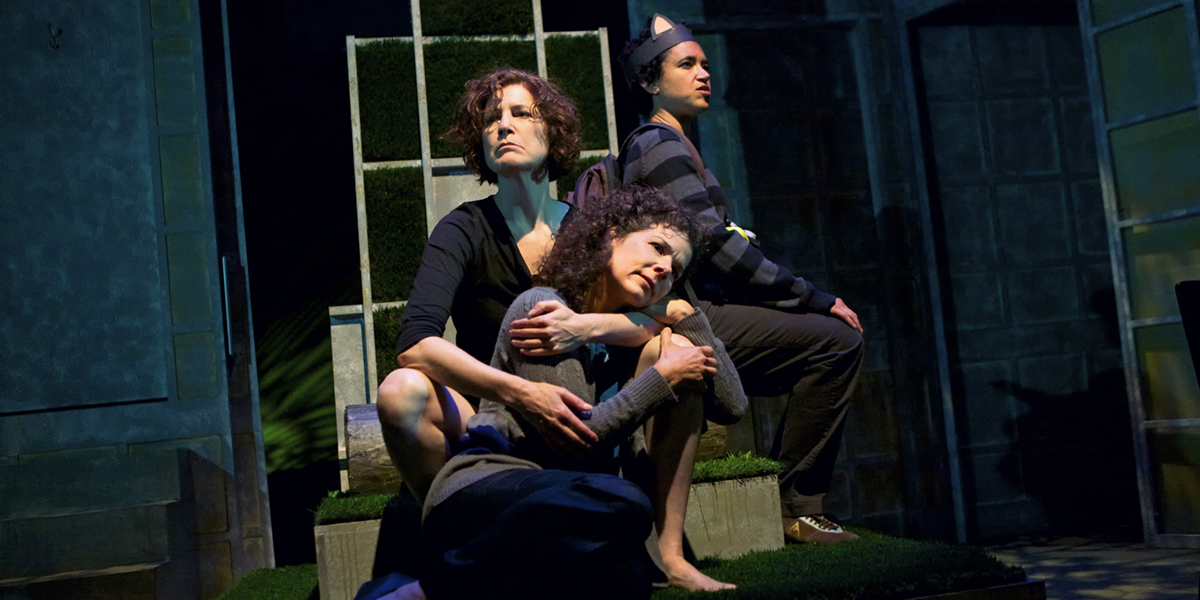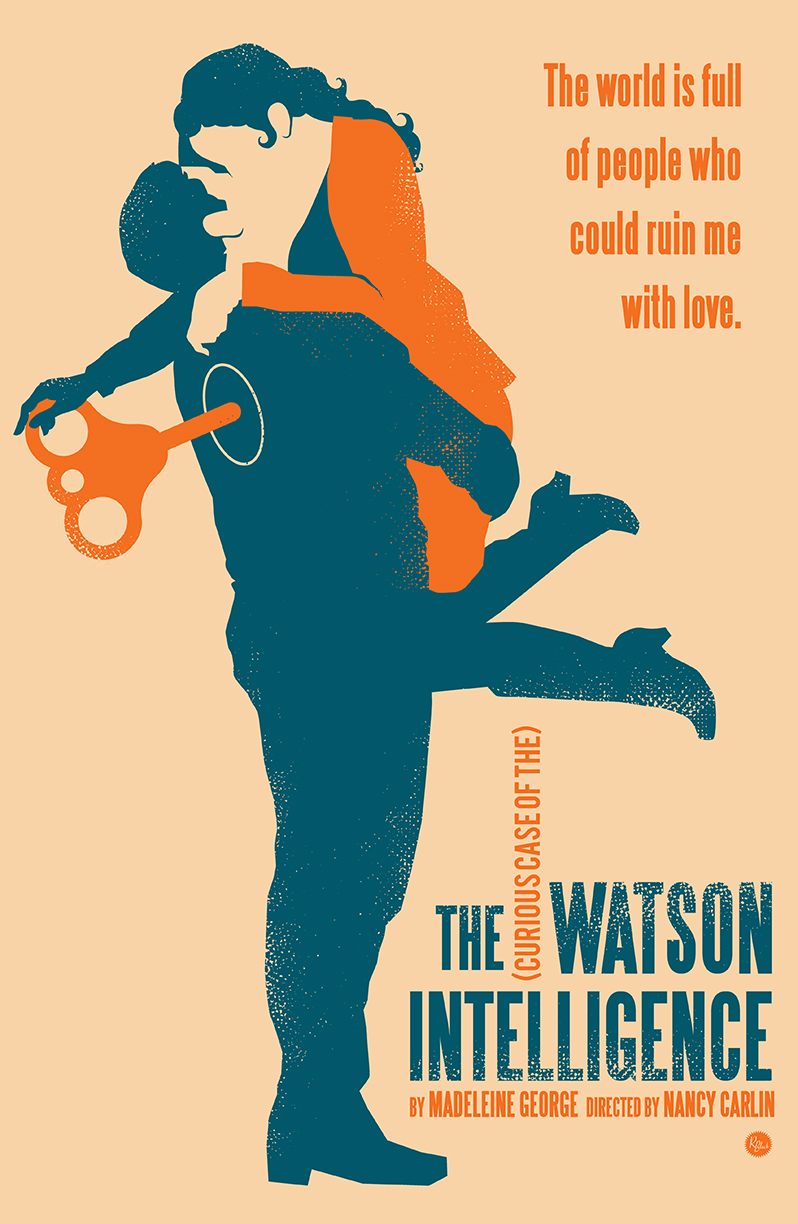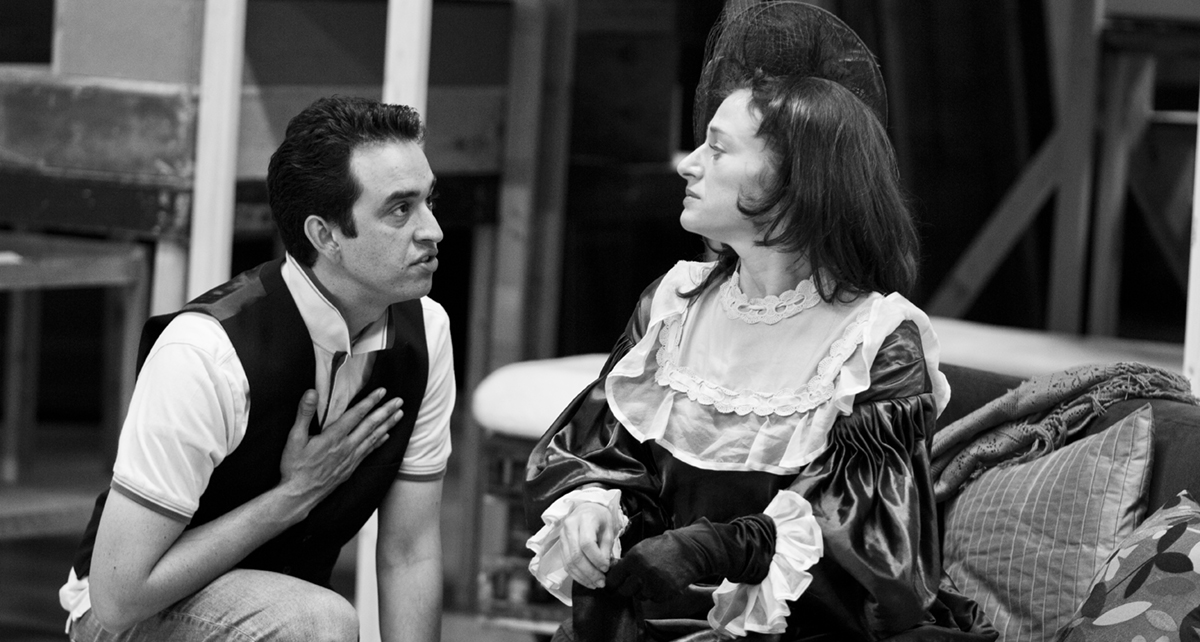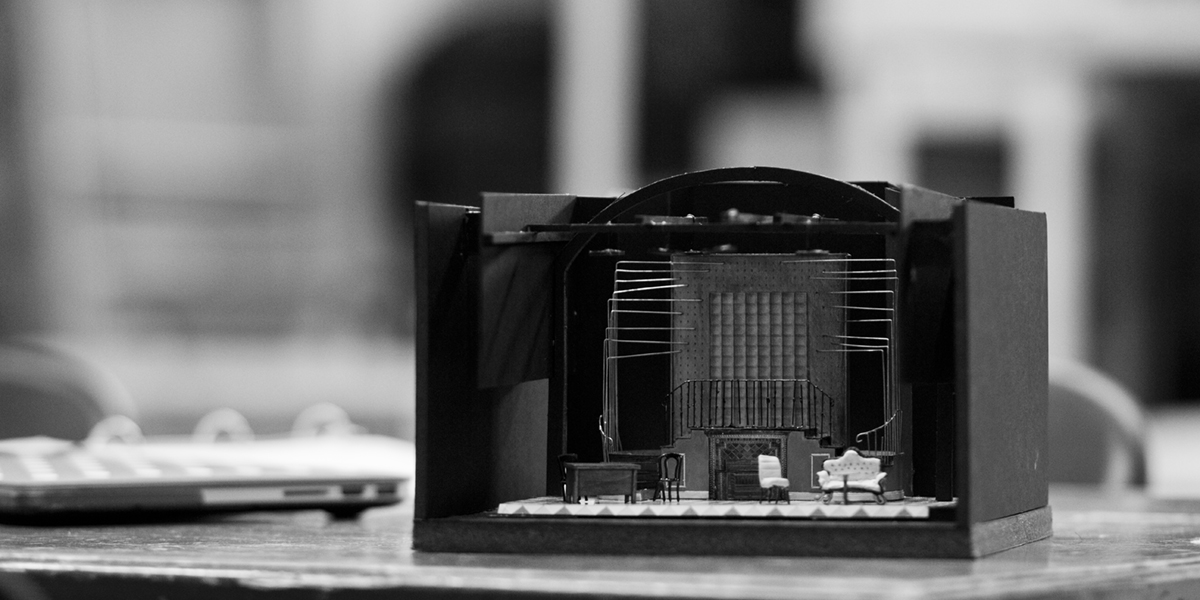What is more perilous than intimacy?
With every technological innovation, our lives become both easier and more complicated. Madeleine George explores four different eras of innovation with inventions ranging from the telephone to artificial intelligence, all with characters striving for connection. The (curious case of the) Watson Intelligence explores the thrilling, ambitious quest for technology against the ever -combustible minefield of human emotions.
Brady Morales Woolery as Watson and Sarah Mitchell as Eliza. Photo by Melissa Nigro.
Democracy is slow. Technology is fast.
One source of inspiration for playwright Madeleine George was the supercomputer named “Watson” that won the Jeopardy tournament. With the advent of artificial intelligence, the possibilities for technology seem endless. In The (curious case of the) Watson Intelligence we will meet Eliza, Merrick, and Watson. These characters inhabit different eras and grapple with questions of how technology can change our world. When we first encounter Eliza, she is working on a groundbreaking idea with artificial intelligence: an ideal companion who will always give you what you need.
“You know, we’re at this critical moment in our society when technology is developing more rapidly than our social and political infrastructures can keep up with. I want to know, how can we use the strengths of the technological moment to leverage empathy for real human lives?”
Eliza wants to change the world for the better. But does she really want the perfection she creates with artificial intelligence in a lover? Each character—in each era—discovers that technology can make connections, but it cannot replicate the human heart. At least not yet!
Watson set design maquette by Nina Ball. Photo by Melissa Nigro.
From Artistic Director Patrick Dooley:
“As theatre artists we all aspire to make works that fire the imagination, appeal to our core humanity, and yes, deeply entertain. When you can do all that AND tap into a dominant zeitgeist in your society, you’ve hit the cultural lottery. No question is dominating the conversation of our world more than the influence of technology on modern life. It’s exhilarating to experience how fast it’s evolving. New inventions and advances are spun out monthly – daily. Basic functions in everyday life are now completely intertwined with with some new app, program, or automated service. And while many of these “advances” are designed to make us feel more “connected” to each other – some are starting to feel a deeper sense of alienation. The very real fear that we cannot unwind this clock is starting seep into our collective consciousness. THESE are the questions and issues that The (curious case of the) Watson Intelligence thrusts forward. “
 The Watson Intelligence playwright, Madeleine George
The Watson Intelligence playwright, Madeleine George
What will we mean by love?
Playwright Madeleine George shares her thoughts on technology, connection, and the ability to love in this interview with Playwrights Horizons:
“…we’re living through a sea change in our relationship with objects. Our most cherished objects no longer seem inert and dependent on us, waiting breathlessly in an empty room for us to come and make them useful. Increasingly, our objects seem to dictate the terms of their own use, and we’re growing ever more dependent on them for our survival. The (curious case of the) Watson Intelligence is my attempt to puzzle out the problem of dependency – on devices, political institutions, and other people.
Click here to read the full interview with Madeleine George.
 Nancy Carlin as the Gorilla with Zehra Berkman and Rami Margron in Precious Little. Photo by Pak Han.
Nancy Carlin as the Gorilla with Zehra Berkman and Rami Margron in Precious Little. Photo by Pak Han.
Watson Needs Shotgun.
In 2012 Shotgun Players produced Precious Little by Madeleine George, with renowned Bay Area artist Nancy Carlin portraying several roles including that of a gorilla in a zoo. Both Shotgun Players and Madeleine George are honored to have Nancy Carlin directing The (curious case of the) Watson Intelligence.
“It’s extremely compelling to me to enter into a director–playwright relationship with an artist who has already worked on one of my plays in a different capacity” writes Madeleine George. “Nancy’s performance in PRECIOUS LITTLE was delicate and finely observed (a tall order, since she was playing both an elderly speaker of a dying language and a gorilla—still—she killed it). I know that she has not just an intellectual but a firsthand, somatic understanding of the way language works in my plays, and I’m eager to see her convey that personalized understanding to a new set of actors. Nancy also has a fresh, expansive take on the play’s big ideas, and I want to see her realize them in three dimensions. “
Director Nancy Carlin comments:
“In 2012, I was in Madeleine George’s gorgeous play, Precious Little. In an evening of brilliantly penned words, perhaps the silences spoke loudest. I played a speaker of a dying language whose childhood words in her native tongue unleash vivid memories. I also played an ape in the zoo, whose entire being and few words exist in the present tense. At the play’s close, the ape’s strong arms comfortingly encompassed the highly intelligent, verbal protagonist, who was reduced to a deeply personal, nonverbal moment.
 The Watson Intelligence director Nancy Carlin
The Watson Intelligence director Nancy Carlin
Nancy Carlin, director of The Watson Intelligence. Photo by Melissa Nigro.
In The (curious case of the) Watson Intelligence, two lonely, Type A, combatants encounter a Watson. Watson: who listens, supports, desires only to give them what they need. They struggle with bad behavior. Their wires get crossed. Each character pounds a fist into their heart. (Sometimes the most sophisticated engine can restart with a good kick.) Working on Watson, first in the Champagne Reading Series, and now through this rehearsal process, we are continually bowled over by the brilliant intricacies of George’s script. She has woven so many threads, the script is as layered, meaningful, and complex as a motherboard. The play itself, like Eliza’s invention, “supports user-directed, affective mirroring interactions.” In other words, it reflects us back to ourselves. Beautifully.
The future hurtles past us, from that first telephone—over wires that operators had to plug into holes to connect—to our Bluetooth devices. In our current technological moment, so much effort goes into creating a kind of virtual or robotic brain, synthesizing multitudes of information to make our lives easier. Artificial Intelligence. But true intelligence comes from listening, happiness from being seen and heard. Listening can’t be quantified or replicated. Control, power, desire for predictability may only lead to loneliness. To connect: that’s the “Watson Intelligence.” Building a bridge to the human heart.”
Not only was Madeleine George impressed with Nancy Carlin, she was also impressed with the Shotgun Players audience:
“The audience Shotgun has cultivated over twenty years in the Bay Area is basically my ideal group of theatergoers: smart, inquisitive, alert to the world around them, hungry for risk, demanding of excellence. This is truly audience as interlocutor–sophisticated groundlings who listen hard and speak back. The conversations I had with audience members during and after the Shotgun production of PRECIOUS LITTLE inflected what the play meant to me, pushing me to think harder about my own dramatic questions…This play in particular, which asks questions about our current technological moment and its implications for the future of human relationships, craves this audience. I’m guessing that the play will be made whole by them. I’ve been on a long odyssey of revision with this play, undertaking a substantial rewrite in 2015, two years after the play’s premiere, and I believe that a Shotgun production, directed by an artist already in deep dialogue with my work, will be the capstone to that process. WATSON needs Shotgun.”
|











